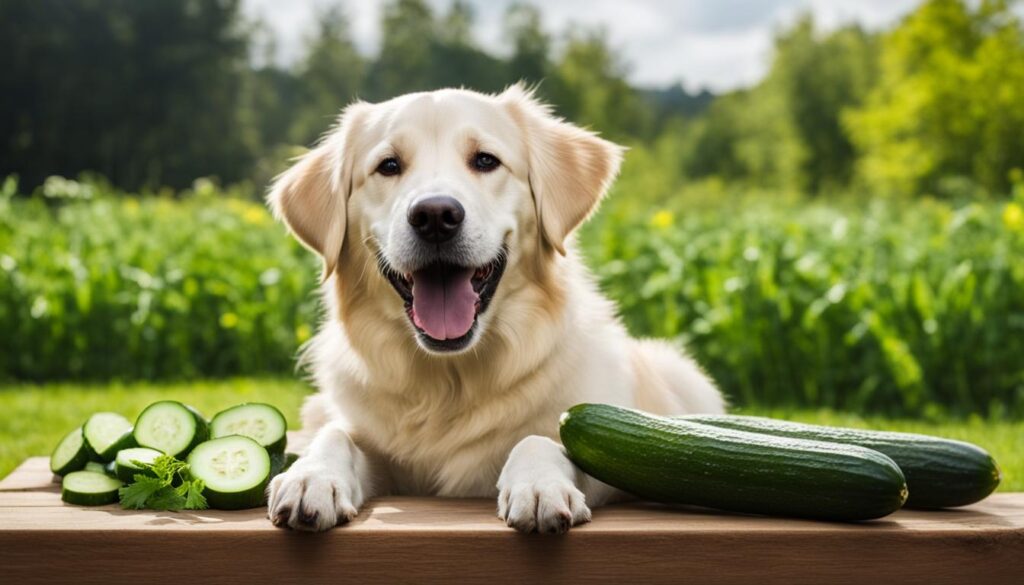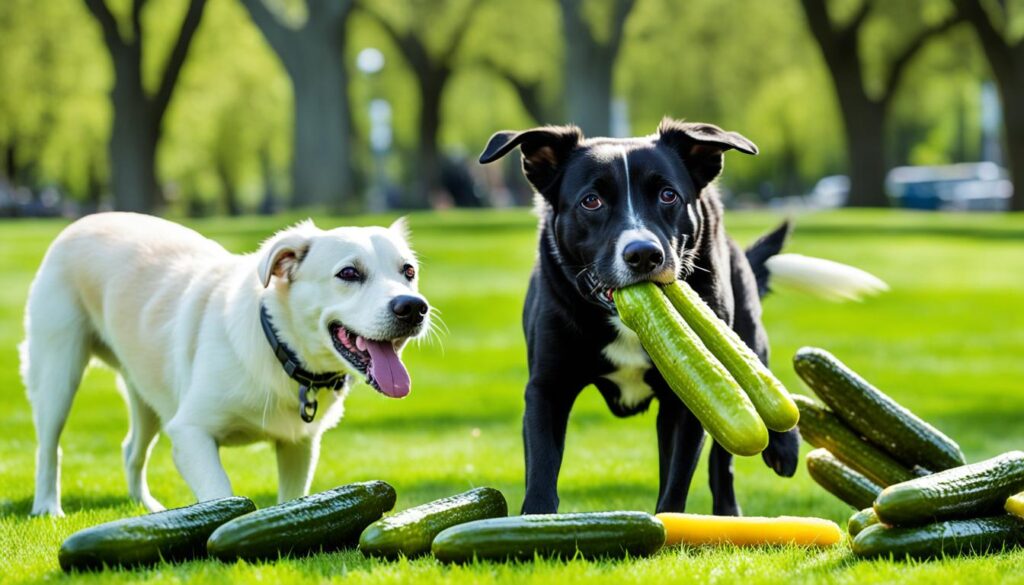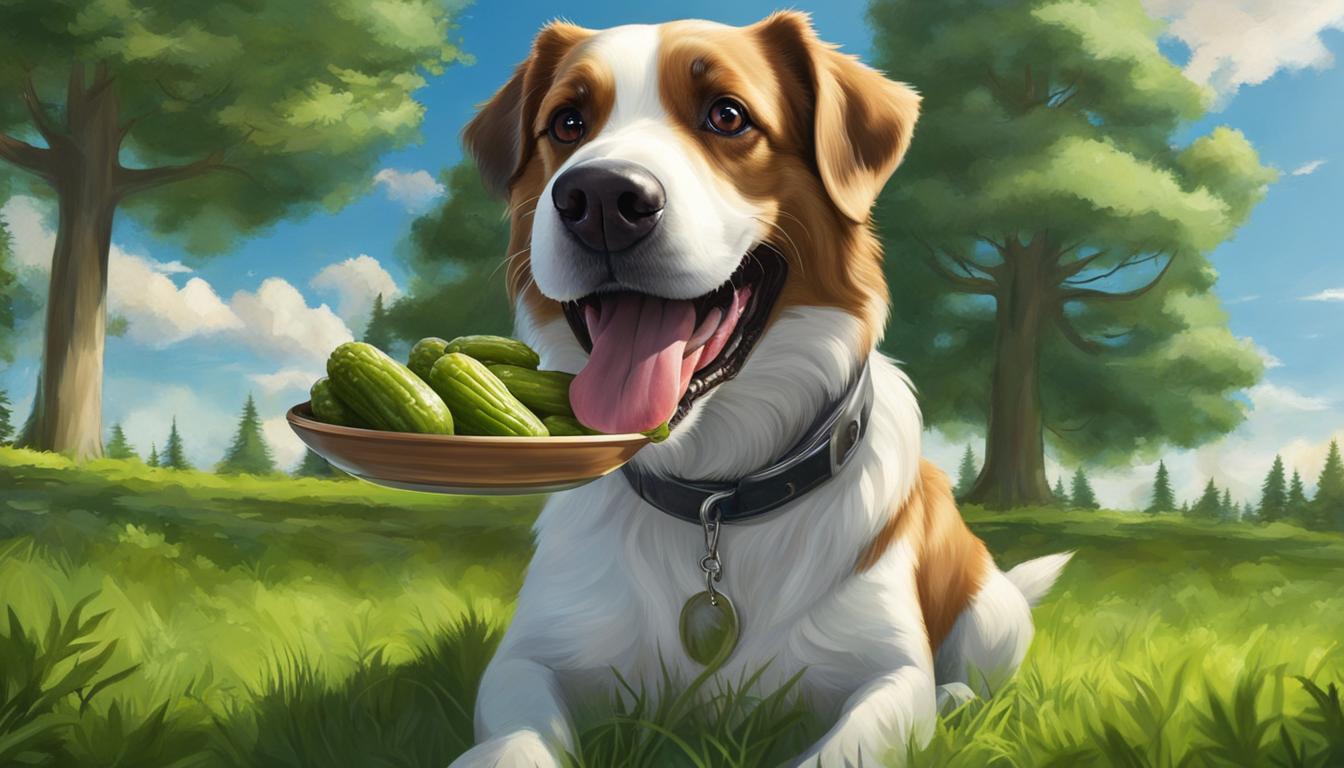As an Amazon Associate I earn from qualifying purchases.
Picture this: it’s a hot summer day, and you’re lounging in your backyard, enjoying a crisp pickle straight from the jar. The tangy taste and satisfying crunch make it the perfect snack to beat the heat. But as you glance over at your furry friend eagerly watching you, a question crosses your mind: Can dogs eat pickles?
Well, before you toss a pickle slice their way, it’s important to paws for thought and consider the potential risks and consequences. While pickles may seem innocent enough, they can actually be harmful to your canine companion.
But why are pickles a no-no for dogs? Let’s dig a little deeper and explore the dangers lurking beneath that briny exterior.
Key Takeaways:
- Pickles contain ingredients like vinegar, onions, and garlic that can be harmful to dogs.
- The components in pickles can upset digestion, decay teeth, cause weight gain, exacerbate heart and kidney disease, and even trigger anemia.
- Cucumbers, the main ingredient in pickles, can be a healthy option for dogs when consumed in moderation.
- When introducing new foods to your dog’s diet, it’s always best to consult with a veterinarian.
- Opt for safer alternatives, such as fresh cucumbers or other dog-friendly fruits and vegetables.
Are Pickles Safe for Dogs to Eat?
Pickles may be a beloved snack for humans, but when it comes to our furry friends, they are best left off the menu. As much as you might love sharing your favorite pickles with your dog, it’s important to know that pickles can potentially harm their health. Let’s dive into why pickles are not safe or healthy for dogs to eat.
The main culprits behind the potential harm of pickles are the ingredients used in their preparation. Vinegar, onions, and garlic are commonly found in pickles, and while they may enhance the taste for us humans, they can wreak havoc on a dog’s digestive system. Moreover, the pickling process itself introduces harmful components that can pose risks to your furry companion.
“But wait,” you might ask, “aren’t cucumbers, the main ingredient in pickles, safe for dogs?” And you’re right! Cucumbers do offer certain health benefits for dogs. They are low in calories and high in fiber, making them a refreshing and nutritious treat. However, the problem lies in the additional ingredients and preparation methods involved in pickling cucumbers.
Pickles often contain an abundance of salt, which can lead to salt toxicity in dogs. High salt intake can cause dehydration, muscle and tissue fluid loss, and even potentially damage the kidneys. Onions and garlic, commonly used in pickling, can be toxic to dogs and may lead to anemia, a condition characterized by a decrease in the number of red blood cells.
So, who should avoid pickles altogether? Dogs with certain health conditions, such as heart or kidney disease, diabetes, obesity, or dental issues, should steer clear of pickles. These conditions can be exacerbated by the ingredients in pickles, making them unsuitable for your furry friend.
When it comes to your dog’s diet, it’s always best to consult with a veterinarian before introducing any new food. They can provide personalized recommendations based on your dog’s specific health needs. Remember, their expertise is invaluable in keeping your furry friend happy and healthy.
The Health Benefits of Cucumbers for Dogs
When it comes to keeping your furry friend healthy, it’s important to provide them with nutritious and safe food options. While pickles may not be suitable for dogs, the main ingredient in pickles, cucumbers, can offer a range of health benefits. Here’s why cucumbers are a pawsome choice for your canine companion:
- Cucumbers are packed with essential vitamins and minerals, including vitamins A, K, and C, as well as magnesium, manganese, calcium, potassium, and phosphorus. These nutrients support overall well-being and contribute to a strong immune system.
- Rich in antioxidants, cucumbers help combat harmful free radicals in your dog’s body, reducing cell damage and promoting healthier cells.
- With their high water content, cucumbers can help keep your dog hydrated, especially during hot summer months.
- Low in calories and sugar, cucumbers are an excellent snack option for dogs watching their weight or with diabetes. The fiber content in cucumbers aids in digestion and can promote a feeling of fullness, helping your dog feel satisfied while keeping their calorie intake in check.
You can serve cucumbers to your dog in various ways:
- Slice them and offer them as a crunchy and refreshing treat.
- Cube them and mix them into your dog’s regular food for added texture and flavor.
- Dehydrate cucumber slices for a chewier snack option that can also help with your dog’s dental health.

Remember, always consult with your veterinarian before introducing any new food into your dog’s diet to ensure it is suitable for their individual needs. While cucumbers offer health benefits, it’s essential to consider your dog’s overall diet and any specific health conditions they may have.
Why Pickles Are Harmful to Dogs
When it comes to pickles, dogs should sit, stay, and avoid them at all costs. While pickles may be a tangy and irresistible treat for humans, they can be quite harmful to our furry friends. Let’s dig a little deeper into why pickles should have a permanent spot on the “do not feed” list for dogs.
The pickling process involves submerging cucumbers in a concoction of vinegar, salt, and spices. Sounds delicious, right? Well, not for dogs. Vinegar and salt, the main ingredients in pickle juice, can wreak havoc on a dog’s delicate system. The acidity of vinegar can cause stomach upset and diarrhea, leaving your pup feeling less than his usual perky self. Additionally, the high sodium content in pickles can lead to salt toxicity in dogs, resulting in dehydration, fluid loss, and even kidney damage.
“Wait, what about onions and garlic? Aren’t those in pickles too?”
Yes, you’re absolutely right! Onions and garlic are commonly used in pickling, and unfortunately, they pose a significant threat to our canine companions. Both onions and garlic contain compounds that can damage a dog’s red blood cells, leading to anemia. This means that Fido could end up feeling weak, tired, or even experience difficulty breathing if he consumes pickles.
“But can’t I just give my dog a small piece of pickle? Surely that can’t hurt?”
While a single accidental ingestion of pickle won’t send your furry friend to the emergency room, it’s still best to avoid giving them any at all. The risks associated with pickles, from digestive upset to anemia, just aren’t worth the momentary satisfaction of seeing your dog enjoy that briny bite.
Stick with the Cucumbers Instead
If your dog gets a case of the FOMO (Fear of Missing Out) when you’re indulging in a pickle, fear not! There’s a healthy and safe alternative available—fresh cucumbers. Cucumbers are the main ingredient in pickles and offer a range of health benefits for dogs without any of the harmful additives.
Did you know that cucumbers are low in calories and packed with nutrients? They’re a great source of vitamins A, K, and C, as well as minerals like magnesium, calcium, and potassium. Plus, the high fiber content can help regulate your dog’s digestion and keep their bowels happy.

So go ahead and embrace the refreshing crunch of fresh cucumbers as a healthy snack for your dog. Chop them up into bite-sized pieces, freeze them as a cool treat, or even toss them into your pup’s food bowl for an extra dose of hydration and nutrition.
Remember, when it comes to pickles, they may be the perfect pairing for your burger, but they’re simply not fit for your four-legged companion. Stick to the safe side and opt for a cucumber instead. Your dog will thank you with wagging tails and well-deserved belly rubs!
The Risks of Pickle Consumption for Dogs
When it comes to pickles, you may be wondering if they are safe for your furry friend. While the occasional pickle bite may not harm your dog, consuming pickles can pose various risks that you should be aware of.
First and foremost, pickles are known for their high sodium content. Dogs that consume large amounts of sodium from pickles may experience dehydration, muscle stiffness, difficulty walking, tremors, and even seizures. Excessive salt intake can lead to high blood pressure and heart issues, especially in dogs with preexisting heart conditions. So, while that salty crunch may be irresistible, it’s important to keep your pup’s sodium intake in check.
But it’s not just the salt that poses a risk. The ingredients used in the pickling process, such as onions, garlic, and spices, can also be harmful to dogs. These ingredients can cause gastrointestinal upset, stomach discomfort, and potential toxicity if consumed in large quantities. Onions and garlic, in particular, can damage a dog’s red blood cells and lead to anemia.
“You want to give me pickles? Paws-itively no! They can upset my tummy and cause all sorts of problems, so keep them away from me.” – Fluffy the Dog
Additionally, sweet pickles that contain high amounts of sugar can be detrimental to dogs with diabetes, kidney disease, or weight problems. The sugar in sweet pickles can contribute to tooth decay, periodontal disease, and other health issues.
So, what’s the best course of action? It’s generally best to avoid feeding pickles to dogs, especially if they have any preexisting health conditions. If you’re looking for a healthier alternative, fresh cucumbers are a safe option. They offer similar health benefits without the added salts, sugars, or seasonings found in pickles.
Risks of Pickle Consumption for Dogs
| Risks | Description |
|---|---|
| Dehydration | Pickles’ high sodium content can cause dogs to become dehydrated. |
| Muscle stiffness | Excessive salt intake from pickles may lead to muscle stiffness in dogs. |
| Difficulty walking | Dogs that consume large amounts of sodium from pickles may experience difficulty walking. |
| Tremors | The high sodium content in pickles can contribute to tremors in dogs. |
| Seizures | In extreme cases, excessive salt intake from pickles can trigger seizures in dogs. |
“Can dogs eat pickles? No way! The risks outweigh the taste. Stick to treats that are safe for me!” – Scout the Dog
As always, it’s essential to consult with your veterinarian before introducing any new food into your dog’s diet. Your veterinarian can provide personalized guidance based on your dog’s specific needs and health conditions. Remember, moderation is key, and treats should generally make up no more than 10% of a dog’s daily diet. Keep your furry friend happy and healthy by making informed choices about their diet.
Considerations for Dogs and Pickles
When it comes to pickles and dogs, it’s important to consider the potential risks and alternatives. While pickles may seem like a harmless snack, they can actually pose certain dangers to our furry friends. Here are some key factors to keep in mind:
- Health risks: Pickles contain ingredients like vinegar, onions, and garlic, which can upset a dog’s digestion and potentially harm their health. The high sodium content in pickles can lead to salt toxicity and dehydration in dogs. Additionally, onions and garlic can cause anemia. Dogs with preexisting health conditions, such as heart or kidney disease, diabetes, obesity, or dental issues, should avoid pickles altogether.
- Safer alternatives: Instead of offering pickles to your dog, consider healthier alternatives like fresh cucumbers or other dog-friendly fruits and vegetables. Plain cucumbers provide similar health benefits without the added salts, sugars, or seasonings found in pickles. Not only are they safe for dogs, but they also offer vitamins, minerals, and hydration.
- Veterinary advice: Before introducing any new food into your dog’s diet, it’s always best to consult with a veterinarian. Every dog has different dietary needs and sensitivities, and what may be safe for humans may not necessarily be safe for dogs. Your vet can provide personalized guidance based on your dog’s specific health requirements.
“Remember, moderation is key, and treats should generally make up no more than 10% of a dog’s daily diet.”
Benefits of Fresh Cucumbers for Dogs
While pickles may not be suitable for dogs, fresh cucumbers can offer several health benefits:
- They contain essential vitamins and minerals that support overall health, including vitamins A, K, and C, as well as minerals like magnesium, manganese, calcium, potassium, and phosphorus.
- Cucumbers are low in calories and sugar, making them a great snack option for overweight or diabetic dogs.
- The high fiber content in cucumbers promotes healthy digestion and helps prevent constipation.
- Fresh cucumbers have a high water content, which aids in hydration.
The Dangers of Pickle Juice for Dogs
While pickles themselves are not recommended for dogs, pickle juice poses additional dangers that pet owners should be aware of. Pickle juice, which contains high levels of salt, vinegar, and spices, can be harmful to your furry friend. The high sodium content in pickle juice can lead to dehydration, electrolyte imbalances, and stress on their kidneys.
Most dogs find the tangy or briny taste of pickle juice unappealing and are unlikely to consume it willingly. However, accidental ingestion can occur if your dog gets into a jar or spills pickle juice from a plate or bowl.
“Remember, dogs are curious creatures and may explore things that catch their attention, so it’s important to keep pickle juice out of reach.”
To prevent any potential mishaps, always store pickles and pickle juice securely, away from your dog’s reach.
| Dangers of Pickle Juice for Dogs | Prevention Tips |
|---|---|
| Dehydration and Electrolyte Imbalances: The high sodium content can dehydrate your dog and disrupt their electrolyte balance, leading to various health issues. | – Ensure pickle jars are tightly sealed and stored out of your dog’s reach. – Clean up any spills promptly and thoroughly. – Keep a close eye on your dog during outdoor gatherings or picnics. |
| Kidney Stress: Excessive salt intake from pickle juice can put strain on your dog’s kidneys. | – Avoid leaving open containers of pickle juice accessible to your dog. – If your dog accidentally ingests pickle juice, contact your veterinarian for guidance and monitoring. |
If your dog happens to consume pickle juice, it is important to monitor them for any signs of gastrointestinal upset or distress. If you notice any unusual symptoms or behavior, consult with your veterinarian immediately.
“Remember, prevention is the key to keeping your dog safe and healthy. Be mindful of the dangers of pickle juice and take the necessary precautions to protect your four-legged companion.”
Conclusion
Well, there you have it: the lowdown on pickles and dogs. While your furry friend may give you those irresistible puppy eyes when you’re enjoying a tangy pickle, it’s best to resist the temptation of sharing this snack.
Pickles, although not toxic to dogs, can pack a harmful punch. The added salts, sugars, onions, garlic, and spices can wreak havoc on your dog’s health, especially if they have preexisting conditions like heart or kidney disease, diabetes, obesity, or dental issues.
But fear not! There are plenty of tasty alternatives for your canine companion. Fresh cucumbers, the main ingredient in pickles, offer similar health benefits without the potential risks. They’re crunchy, refreshing, and packed with essential vitamins and minerals that your dog will love. And for a little extra pizzazz, there’s a whole world of dog-friendly fruits and vegetables just waiting to be discovered.
Remember, when it comes to your dog’s diet, it’s always best to consult with a veterinarian. They can provide tailored advice and recommendations based on your dog’s specific needs. By choosing the right foods and avoiding pickles, you’re taking an important step in ensuring your furry friend’s well-being and keeping their tail wagging with joy.
FAQ
Can dogs eat pickles?
Are pickles safe for dogs to eat?
What are the health benefits of cucumbers for dogs?
Why are pickles harmful to dogs?
What are the risks of pickle consumption for dogs?
What should I consider when it comes to dogs and pickles?
Is pickle juice safe for dogs?
Can dogs have pickles?
Source Links
- https://www.pumpkin.care/blog/can-dogs-eat-pickles/
- https://www.petinsurancereview.com/blog/can-dogs-eat-pickles
- https://www.thelabradorsite.com/can-dogs-eat-pickles/comment-page-1/
As an Amazon Associate I earn from qualifying purchases.

